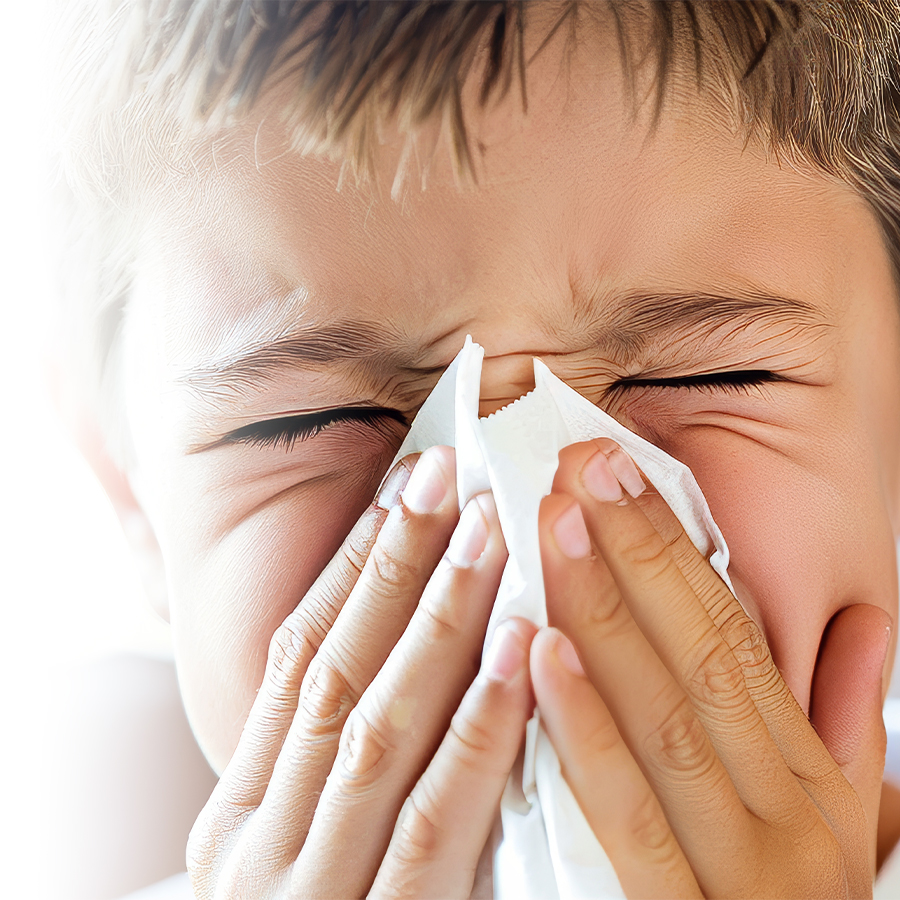Is your child looking forward to playing outside in the warm weather? Don't let seasonal allergies spoil their outdoor activities!
Seasonal allergies: what are they?
Seasonal allergies occur at a specific time of year, which varies from person to person, and sometimes even from year to year. They occur in reaction to airborne allergens such as pollen. Seasonal allergies are a common reason for pharmacy consultations and requests for advice. The number of people suffering from seasonal allergies has risen dramatically in recent decades, and little ones are not spared!
When your child comes into contact with this kind of agent, their immune system defends itself by releasing very specific antibodies called immunoglobulin E (or IgE). These stimulate certain cells to release large quantities of a chemical called histamine into the bloodstream. It is the presence of histamine in the blood and its distribution to different parts of the body that cause the typical symptoms of seasonal allergies.
How to recognize allergic reactions?
Allergic reactions in children can vary depending on the season and the type of allergen, such as pollen. Unlike a common cold, these reactions are recurrent, without fever, and occur mainly after outdoor exposure. These reactions may be similar to a cough or respiratory symptoms. Being attentive to the regularity of symptoms and their relationship to the environment helps to distinguish them.
What are the symptoms of pollen allergy in children?
If your child suffers from seasonal allergies, they may be bothered by the following symptoms:
- Nasal congestion;
- Nasal discharge;
- Repeated sneezing;
- Tingling of the eyes, nose, throat, palate or ears;
- Red eyes;
- Watery eyes;
- A dry cough.
To determine whether your child has a pollen allergy, you first need to observe the frequency and context of symptoms. If they recur cyclically or worsen when your child plays outdoors, it's most likely a seasonal pollen allergy.
What is the worst month for seasonal allergies?
Seasonal allergies often occur at the same time every year, especially in spring and summer, when pollen counts are high.
August is often considered the worst month for seasonal allergies, particularly due to the proliferation of ragweed. This widespread plant releases huge quantities of allergenic pollen, especially from mid-August onwards. This microscopic pollen is capable of travelling long distances, making it difficult to avoid, even in urban areas.
What are the other high-risk months for pollen allergies?
In addition to August, May and June are also problematic for children allergic to tree and grass pollen. Each pollen season has its own particularities, which is why it's important to consult pollen bulletins in order to adapt outdoor activities. As a preventive measure, give priority to outings at the end of the day, wash clothes after exposure and regularly clean your child's nose with a saline solution.
How can I prevent allergy symptoms?
To limit exposure to pollen, it is best to plan your child's outdoor activities for the late afternoon, when pollen counts are lower. After the rain, pollen settles to the ground, making for risk-free walks.
Change your child's clothes as soon as they come home, and ask them to wash their hands to prevent pollen from spreading indoors. Keep windows closed and use air conditioning, especially in your child's bedroom.
Can seasonal allergies affect your child's sleep?
Seasonal allergies can greatly affect children's sleep quality. In particular, persistent nasal congestion, itchy eyes and night-time coughing can make it difficult to fall asleep and cause frequent awakenings during the night. Lack of sleep not only impairs concentration and learning, but can also increase irritability and fatigue during the day.
To improve your child's nights, remember to elevate their head slightly with a pillow, keep their bedroom pollen-free (windows closed, bedding changed regularly) and wash their nose before bedtime. If sleep problems persist despite these measures, we recommend you consult a health care professional.
Hay fever and cough: Is medication necessary to relieve symptoms?
When a child's seasonal allergy symptoms become worse (persistent coughing, severe nasal congestion, marked discomfort, etc.), certain medications can provide rapid relief. In the pharmacy, saline solutions help clear the respiratory tract by thinning secretions. They are particularly effective in relieving congestion without the need for stronger treatments.
If allergic reactions are accompanied by symptoms such as fever, it is advisable to consult a heath care professional to determine whether further medical treatment is required.
To learn more about child-friendly nasal hygiene, see our article “Nose care: good habits to adopt.”
What is the role of antihistamines for children?
Some medications, called antihistamines, are available as oral liquids, fast-dissolving tablets or scored tablets (easily cut in half). They can help relieve allergy symptoms in toddlers.
As with any over-the-counter medication for children, always ask your pharmacist for advice before buying an antihistamine. In addition to helping you make a clear and informed choice, you will receive all the information you need on how to use the medication, precautions to take and possible side effects. And keep in mind the importance of measuring the right dose for your child's age and weight.
What long-term treatments are available for pollen allergies?
In some cases, treatment by a doctor, such as an allergist who specializes in allergies, will be considered. Pollen desensitization, also known as immunotherapy, can be considered in particular for children aged 5 and over. It involves repeated administration of a specific allergen under the skin over a period of 3 to 5 years.
Consult your doctor or pharmacist for more information on seasonal allergies and their treatment.

